Many people with Alzheimer’s or dementia can become increasingly confused, anxious and agitated later in the day. They may also have disrupted or restless sleep.
These are typical ‘sundowning’ symptoms which can be tricky to manage. They can be stressful for the whole family, so we’ve pulled together some useful information on why this behaviour happens and ways to reduce and manage the symptoms.
What is ‘sundowning’ and why does it happen?
It’s called ‘sundowning’ as it tends to occur late in the afternoon or the evening. There’s no clear evidence for why it happens but many think it’s caused by the changes happening in your loved one’s brain.
What are the symptoms of ‘sundowning’?
When your loved one may be:
Disoriented
Restless
Irritable
Demanding
Agitated
Upset
Anxious
Confused
Suspicious
They may also exhibit the following behaviours:
Pace the room
Yell or get cross
See or hear things that aren’t there
Have mood swings
6 ways to reduce and manage sundowning symptoms
1. Establish a daily routine
Developing and sticking to a regular daily routine can make your loved one feel more secure and will reduce stress.
For example, make sure you set regular times for waking up, meals, snacks and going to bed.
It’s best to arrange appointments, outings, visitors, and bath time in the earlier part of the day, when they’re likely to feel their best.
2. Keep a track of their behaviour
It’s important to figure out what are your loved one’s biggest triggers for becoming upset or agitated. By tracking when their behaviour happens and how severe it is you can begin to look for patterns.
The triggers can be particular activities, environments or needs so try to be as detailed as possible when noting these down. You can then help them avoid or manage those tricky times that you know are likely to cause upset.
3. Keep things calm
Minimising noise, distractions and shadows can help your loved on feel safe as certain behaviours are often triggered by overstimulation or fear.
Closing curtains and blinds before daylight starts to fade can help avoid dim light playing tricks on their eyes and brains which can cause anxiety. Turning on plenty of lights will also help.
Noise can also cause distress so turning the TV or music down and avoid particularly noisy activities like vacuuming.
You could also play low level soft music or use aromatherapy to create a relaxing environment.
4. Make sure their basic needs are met
A couple of hours before their symptoms usually begin, go through the checklist below to ensure they’ve got/done everything they need.
It’s better to not wait for them to ask – gently encourage them as they may not be aware enough to be able to express themselves.
‘Sundowning’ is more likely to happen when your loved one is:
In need of the toilet
Hungry or thirsty
Feeling pain or discomfort
Too hot or cold
Bored
Having trouble sleeping
5. Keep a check on your own stress level
Sundowning can by frustrating and exhausting for you too. That’s completely understandable and it’s important you look after yourself as well.
People with dementia are often more sensitive to body language and tone of voice so they may well pick up on your stress which can lead to their own agitation.
There are a number of tips to help you cope including taking small breaks during the day, getting regular help, or taking a few moments to yourself a short while before their symptoms usually begin.
Take a look at our blog on how to take a break when caring for a loved one for more tips.
6. Focus on their sleep quality
Dementia can be exhausting so it may cause your loved one to want to nap in the day. But this can make it tricky to sleep through the night.
A restless night’s sleep can in turn lead to more fatigue in the daytime, leading to a vicious circle that only escalates ‘sundowning’ symptoms.
So, focusing on a structured daily routine that minimises afternoon naps is important. If they do need one, try to encourage it early afternoon and for it to be a brief ‘cat nap’.
Gentle exercise daily will also improve sleep quality. We pulled together some simple gentle exercises in our blog here.
It’s also worth limiting stimulants like big meals, smoking, caffeine, sugar, chocolate or alcohol.
Weighted blankets, white noise machines, aromatherapy or tweaking the room temperature are also worth experimenting with to see the difference they make.
We know care giving is a hugely demanding task both physically and mentally, but we hope these tips help make evenings more peaceful for both your elderly loved one and your family.
Plus, don’t forget, there’s no shame in asking for help. Respite care visits can give both you and your loved one a break so you can come back refreshed or having just one visit a week to give you both some space can work wonders. Knowing your loved one is in safe hands whilst you’re not there means a huge weight it lifted.
Helping your loved one to continue living independently and confidently in your own home.
By providing a range of support at home, we’re helping many clients across Bath & North East Somerset and West Wiltshire retain their independence and stay in control in the comfort of their own homes.
Remember we’re always here if you want to chat about your care options. Just get in touch:
0333 043 4880 or email enquiries@abneyandbaker.com



